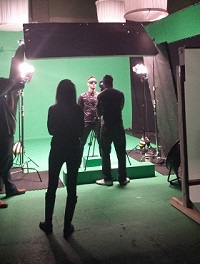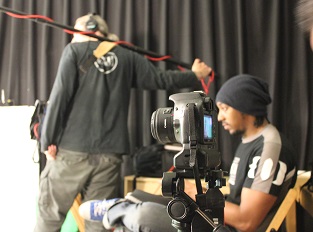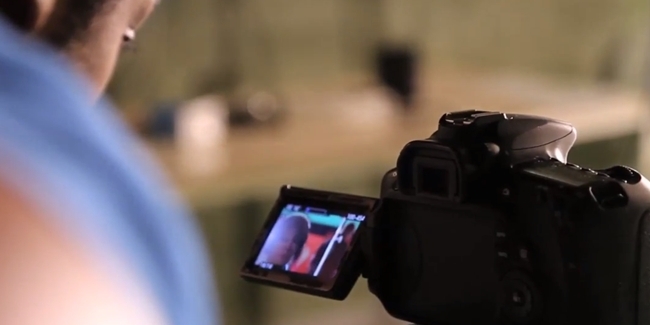Ready for a helpful oxymoron? Here is a collection of universal and specific advice to help forge a path into music video production – read on; you’ll get what I mean.
LEARNING LINGO
“Video production”, two words that mean a lot different things; ever changing and evolving. Yeah you could jump straight in with a camera but learning about film making gives you an instant head start.
‘Close up’, ‘Two shot’, ‘tracking’, ‘shot list’, ‘call sheet’ are just a few terms out of many you need to know, some are straight forward, others can be misleading or easy to mix up. Having studied Film from the age of 16 (probably significantly older than school children these days) I was able to learn many technical terms and what they represent.
These are all available online with IMDb who provide a comprehensive database at www.imdb.com/glossary and can help differentiate between panning and tracking, high angle and low angle (the angle is based on the position of the camera).
Equipment is a tricky area. How do you become familiar with all film equipment? In truth, it’s bloody hard and most of the time you won’t know exactly what they are, what they do and how they work unless you experience them first hand.
Of course there’s the basic equipment which is in regular use and a good reference point in relation to power of light and effect of equipment. I would consider redheads, 2K’s and keno’s to be the basic lights and tracks, tripods, C-stands, trace, gels and poly boards to be among the basic equipment list. Then again, your experiences may differ.
This basic level of knowledge on terminology and equipment will help you hit the ground running on the road to film making.
THE GET IN
How do you get a foot in the door? You need experience to get production work and you can’t get any production work unless you get experience. That first job can be hard; even if you have a degree in film, but here’s a little secret: NEARLY ALL PRODUCTION COMPANIES NEED RUNNERS!
To find production companies the best approach is to make a specific google search: advert production companies, music video production companies etc. Alternatively there are networking events held by companies such as Production Base and Phink TV.
The first piece of advice is to persevere; call, email, call again. Be persistent but NOT annoying, often production companies forget names of potential runners because there are so many enquiries but don’t fret; often production companies choose runners purely on the basis of them being the most recent person to contact them.
One trick that’s been useful on both sides of the phone is not to ask if a production company is looking for runners because the answer can simply be “No”. Instead start a conversation by finding out what the company specialises in and how they achieve it to find out how you can be of use and don’t forget to follow up with an email and another phone call!
RUNNING AND SPYING
Like 99% of people you’ll start at the bottom. Making tea, lugging equipment, making tea, going to the shops, making tea; needless to say that by the end you’ll be pretty good at making tea. You probably won’t be getting paid and if you’re lucky enough to; it won’t be much.
On one side it’s a shame but on the other it separates the “looky loos” from the serious film makers. First jobs in production are seldom glamorous BUT knowledge of basic equipment and terminology (outlined in the last paragraph) will help avoid the ever annoying term “thingy” and help build a crew’s confidence in you.
If your job is unglamorous then your responsibilities are small, if your responsibilities are small then you have the freedom to find out more about what people are doing in their jobs. There are many many different roles and this is a great way of finding out what you’re best suited for. Are you more organised than creative? Are you more of a writer than a director? Set builder? Camera operator? Electrician? The list goes on.
The best tip at this stage is to consider what you’re good at, what you’re most interested in and hope that the two work well together. In most cases they will.
LEARN BY DOING
Say you’ve got some experience by now working on other people’s productions. Say you have a creative concept or a mate who’s got a song. Now’s a good time to see what you’ve got. The most valuable things you can learn are often from your own experiences and mistakes. It could be directing actors in their performance, planning, organising a crew, using equipment optimally, getting locations, planning, footage coverage, scheduling – if you haven’t been paying attention planning is VERY important.

When you are making a production (even if it’s your first) you get a good sense of what’s most important to focus on and when. Before the shoot; it’s all about the planning, during the shoot you’re putting the plan to action and bringing your creative vision to life, for the edit you’re putting the pieces of the puzzle together. Each shoot brings new experiences to learn from.
Actually making a video helps you discover what you are most talented at. It gives you a clear idea of the level you are able to operate (small budgets to big crews) and the level of quality you are able to achieve (no shame in making a student-ie film we’ve all been there).
FROM FREEBIES TO CHEAPIES
So you’ve made one or a few productions for nothing, now it’s time to make one for practically nothing. Don’t get me wrong this doesn’t mean you’ll go from making £0 to £100, you could be moving up to budgets in the hundreds (realistically speaking) but will probably end up spending all of it on the production leaving nothing for yourself.
Another good lesson – how much things actually cost. At this stage you can pick up/develop important skills such as bartering, sorting favours (to be paid back of course) and clever ways to achieve otherwise unaffordable shots.
This is where some film makers start to shine, their ability to achieve a lot with very little. However, it is important NOT to make this approach a regular thing as no one wants to work for the person who never pays well and locations may not want to accommodate you if you always short change them.
EYES AS BIG AS YOUR MOUTH
When money begins to change hands you’ve gone from working on your own stuff to working with clients and on this there is one major piece of advice: MAKE SURE YOU CAN DELIVER WHAT YOU OFFER! This counts for both minor details and the product as a whole.
You say you’re going to film some under water shots then you film under water shots, you sell a client on the idea of a music video all done in one take then that’s what you have to give them. Reputation’s an important thing. I have come across a few beginner film makers with great ideas, big ideas but no idea how to bring them to fruition and when you disappoint a client that’s what they remember you for.
Your pitch has to match your ability, skill set and what is realistically achievable. Now that’s not to say you can’t work six months on a project in your spare time to get VFX juuust right, you just have to deliver the video they bought when you said it would be ready.
YOUR SIGNATURE
With a few productions under your belt you will achieve a realistic understanding of where your talents lie be they producing, editing, lighting, directing etc. Within these areas you’ll find that there may be a certain aspects you shine. As a director you may be great at alternative videos, studio shoots, big set concepts, emotive film making.
 As a producer you might show talent in finding great locations, having access to amazing crews, physics defying logistical planning. I could go on. How you work and what you create becomes unique to you and how people recognise your work, a signature. We can all tell a Tarantino movie or a Wes Anderson flick a mile off (although these are extremes), having a unique approach to film making in any of its epochs is invaluable.
As a producer you might show talent in finding great locations, having access to amazing crews, physics defying logistical planning. I could go on. How you work and what you create becomes unique to you and how people recognise your work, a signature. We can all tell a Tarantino movie or a Wes Anderson flick a mile off (although these are extremes), having a unique approach to film making in any of its epochs is invaluable.
Your signature becomes something that you can strengthen and play up to that reflects how you understand and relate to film but at the same time being flexible can make you more interesting to a wider range of clients.
TEAM EFFORT VS SOLO VENTURE
“Should I get a team together?” “Should I work by myself?” “Maybe I’d be best suited with a partner. I don’t know how did Spielberg do it?” These are things we all consider as film makers.
This can be in relation to you starting out, going pro or moving up to big productions. An important side not is this: EVERYTHING YOU WILL ACHIEVE WILL BE THROUGH THE HELP OF OTHER PEOPLE.
Okay you can produce, direct, shoot and edit a video solo (we all have) but the more help you have the more your main job is relaxed. The best way to answer the question of team or solo is “both”.
If you feel that what you do and how you work is best supported on your own then do it, less people to email. If you have a group of friends you know, trust, work well with and share creative interests then by all means pull it together.
Alternatively you can do both, I personally do some productions solo and others as part of a team depending on what the job entails, some solo directors also operate as part of a larger production company.
WEB IT
Use the internet. You want people to see your work, upload it. Yes there’s YouTube and Vimeo which are (arguably) the most important video sites to place your work.
Vimeo has a more “professional” reputation due to its quality streaming options whereas YouTube is considered more accessible and the unofficial home of the viral.
However there are also sites such as ideas tap (ideastap.com), shooting people (shootingpeople.org) and talent house (talenthouse.com) where you can create your own profiles to show off some or all of your work.
These sights also have competitions and applications to funding that you can enter; you can access the network to ask pressing questions or just use the network to network. Also nothing says serious film maker like someone with their own website site.
These days due to programs like wordpress; making your own website has never been easier and a simple website that shows your work or even a showreel can go a long way, not a YouTube link but a personalised site.
These are just a few online tips that can be helpful but the internet is a big place filled with many untapped resources.
Tai Campbell, Creative Director @EpikMusicVideos
04/11/2013


